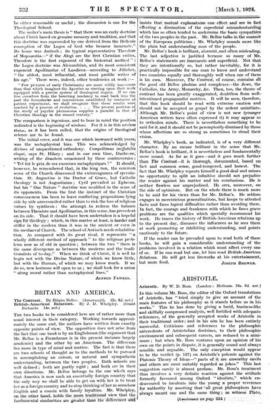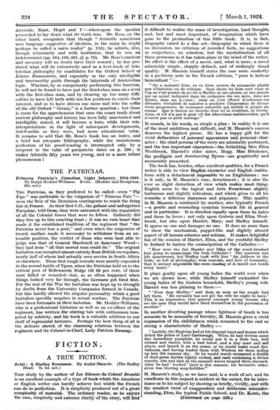ARISTOTLE.
Ix this volume Mr. Ross, the editor of the Oxford translations of Aristotle, has " tried simply to give an account of the main features of his philosophy as it stands before us in his works." This he has done by giving a lucid, business-like and skilfully compressed analysis, well fortified with adequate references, of the generally accepted works of Aristotle in their traditional order ; and in his aim he has been entirely successful. Criticisms and references to the philosophic antecedents of Aristotelian doctrines, to their philosophic environment and subsequent careers, are reduced to a mini- mum ; but when Mr. Ross ventures upon an opinion of his own on the points in dispute, it is generally sound and always sensible and arguable. The only exception would appear to be the verdict (p. 157) on Aristotle's polemic against the Platonic Theory of Ideas—" parts of it are unworthy cavils and others are most suitably regarded as jokes." This last suggestion surely is almost profane. Mr. Ross's treatment thus involves a very definite reaction against the attitude formerly favoured among Oxford " idealists," which en- deavoured to inculcate into- the young a proper reverence for authority by asserting that all great philosophers have always meant one and the same thing ; as witness Plato,
(Cantinuta on page 334 )
Aristotle, Kant; Hegel and I-'—whereupon the speaker proceeded to lay down what the truth was. Mr. Ross, on the other hand, recognizes that though " Aristotle sometimes uses language suggestive of idealism, in the main he might perhaps be called a naive realist" (p. 132); he admits, also, though reluctantly and with hesitation, that he was an indeterminist (pp. 164, 188, 201, cf. p. 78).. Mr. Ross's candour and accuracy will no doubt have their reward ; he has pro- duced what will be extensively used as a text-book of Aris- totelian philosophy by candidates for the Oxford School of Literae Humaniores, and especially as the only intelligible and trustworthy guide through the labyrinth of Aristotelian logic. Whether, by so competently performing this function, he will not be found to have put the third-class man on a level with the first-class man, and by clearing up too many diffi- culties to have left both with too few problems to excite their interest, and so to have driven one more nail into the coffin of the old Oxford " Greats," is a- further question ; but there is room for the apprehension that once the exact truth about ancient philosophy and history has been fully ascertained and intelligibly stated, it will become a bore, while their mis- interpretations in the light of subsequent developments, indefensible as they were, had more educational value. It remains to add that Mr. Ross's book has an index, and a brief but adequate bibliography, while the monotonous. perfection of his proof-reading is interrupted only by a misprint in the table of peripatetic dates on p. 296 ; it makes Aristotle fifty years too young, and so a mere infant phenomenon











































 Previous page
Previous page